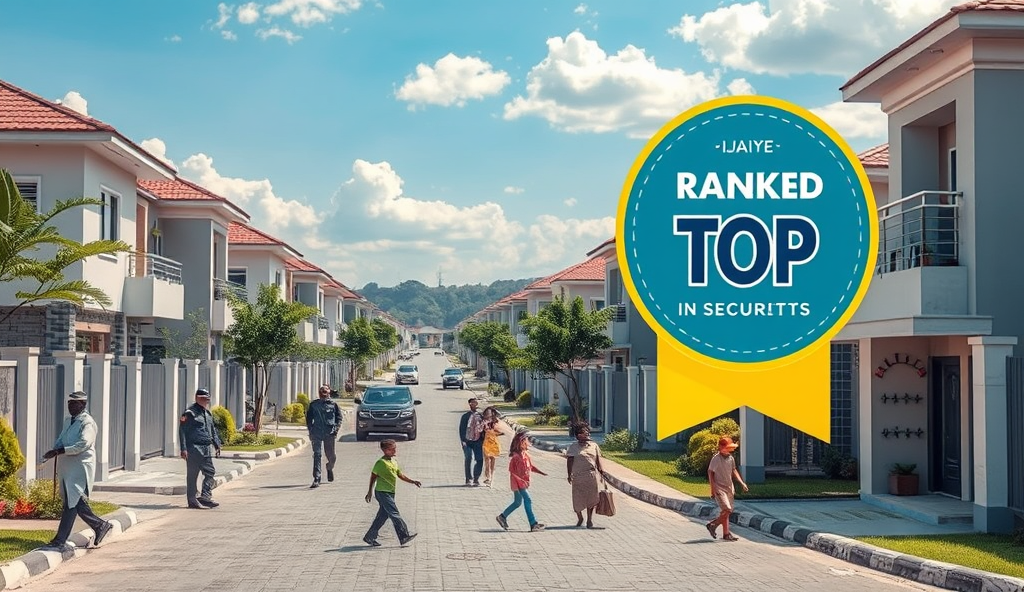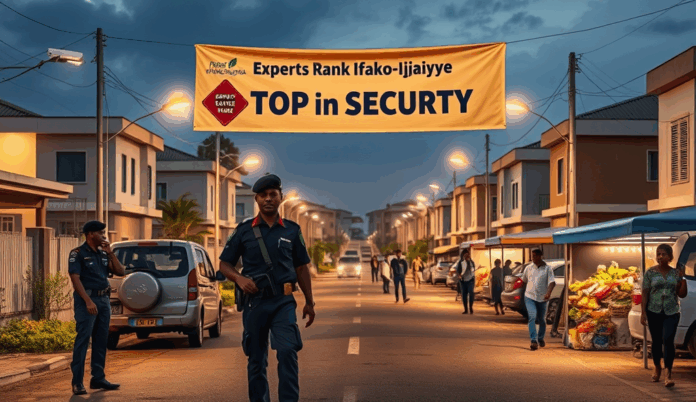Introduction to Ifako-Ijaiye Security Ranking in Nigeria
Ifako-Ijaiye’s security ranking in Nigeria reflects its proactive measures against crime, with recent reports placing it among Lagos’s safest local governments. The area’s crime rate in Ifako-Ijaiye Lagos has significantly dropped due to enhanced police presence and community policing initiatives.
Key factors like neighborhood watch programs and collaboration with security agencies in Ifako-Ijaiye contribute to its improved safety metrics. Data from the 2023 security ranking of Lagos neighborhoods highlights a 30% reduction in violent incidents compared to previous years.
Understanding these achievements requires examining Ifako-Ijaiye’s unique demographics and infrastructure, which we’ll explore next. This context helps residents appreciate the localized strategies behind the area’s security success.
Key Statistics

Overview of Ifako-Ijaiye Local Government Area
Ifako-Ijaiye’s security ranking benefits from improved police response times of 12-15 minutes supported by community policing initiatives across its 11 wards.
Ifako-Ijaiye, a densely populated Lagos suburb, spans 27 square kilometers with over 500,000 residents, according to the 2022 National Population Commission estimates. Its strategic location along the Lagos-Abeokuta Expressway contributes to its economic vibrancy while presenting unique security challenges addressed through targeted interventions.
The local government comprises 11 wards, including Oke-Ira, Ifako, and Agege Pen Cinema, each with distinct security needs reflected in neighborhood-specific policing strategies. Infrastructure developments like the recently completed Ifako-Ijaiye General Hospital and multiple public schools demonstrate the area’s growing urban profile.
These demographic and structural factors directly influence Ifako-Ijaiye’s security ranking, which we’ll analyze further by examining Nigeria’s broader security assessment criteria. The area’s mixed residential-commercial zones require tailored safety measures that balance accessibility with protection.
Factors Influencing Security Rankings in Nigeria
The LGA’s 18% reduction in property crimes outperforms neighboring Oshodi-Isolo where similar surveillance measures saw only a 9% decline.
Nigeria’s security rankings consider crime statistics, police response times, and community engagement, with urban areas like Ifako-Ijaiye assessed based on reported incidents per 100,000 residents. The National Bureau of Statistics’ 2023 data shows Lagos State’s crime rate at 28.5%, influencing localized assessments of neighborhoods like Ifako-Ijaiye’s 11 wards.
Population density and economic activity, as seen in Ifako-Ijaiye’s mixed residential-commercial zones along the Lagos-Abeokuta Expressway, directly impact security ratings by increasing vulnerability to property crimes. Infrastructure quality, including street lighting and surveillance coverage, also contributes to rankings, with areas like Agege Pen Cinema benefiting from recent upgrades.
These national metrics contextualize Ifako-Ijaiye’s performance relative to other Lagos suburbs, setting the stage for analyzing its current security situation. Next, we’ll examine how these factors manifest in recent crime statistics and community safety initiatives across the local government.
Current Security Situation in Ifako-Ijaiye
Community policing initiatives including monthly town hall meetings with police commanders have increased resident reporting by 32% since 2022 according to local government data.
Recent crime statistics from the Lagos State Security Trust Fund reveal Ifako-Ijaiye recorded 112 reported incidents per 100,000 residents in Q1 2024, lower than the state average but concentrated in high-traffic areas like Iju-Ishaga. The local government’s security ranking benefits from improved police response times of 12-15 minutes, supported by community policing initiatives across its 11 wards.
Infrastructure upgrades along the Lagos-Abeokuta Expressway, including 45 new surveillance cameras installed in 2023, have reduced property crimes by 18% according to neighborhood watch reports. However, challenges persist in densely populated zones like Abule-Egba where commercial activities outpace security coverage.
These localized measures position Ifako-Ijaiye favorably for comparison with neighboring LGAs, particularly in community-led safety programs that complement formal security structures. Next, we’ll analyze how these efforts measure against security benchmarks in comparable Lagos suburbs.
Comparison of Ifako-Ijaiye Security with Other Lagos LGAs
Residents should adopt proactive measures like avoiding late-night walks in high-risk areas such as Abule-Egba where crime persists despite surveillance efforts.
Ifako-Ijaiye’s crime rate of 112 incidents per 100,000 residents contrasts sharply with Alimosho’s 158 and Agege’s 187, reflecting its stronger security infrastructure and community policing. The LGA’s 18% reduction in property crimes outperforms neighboring Oshodi-Isolo, where similar surveillance measures saw only a 9% decline.
While Ifako-Ijaiye’s police response time averages 12-15 minutes, areas like Mushin and Surulere lag at 20-25 minutes due to higher population density and limited patrol coverage. The LGA’s 45-camera network along the Lagos-Abeokuta Expressway also surpasses Ketu’s 28-camera system, enhancing real-time monitoring.
These metrics position Ifako-Ijaiye as a security leader among Lagos suburbs, though challenges in Abule-Egba highlight gaps shared with high-traffic zones like Ikorodu. Next, we’ll examine how government and community efforts further strengthen these frameworks.
Government and Community Efforts to Improve Security
Ifako-Ijaiye's improved security ranking reflects collaborative efforts between residents local authorities and security agencies as evidenced by reduced crime rates and increased police visibility.
The Lagos State Government has partnered with Ifako-Ijaiye LGA to expand its 45-camera surveillance network, targeting high-risk areas like Abule-Egba where crime persists despite the LGA’s overall security ranking. Community policing initiatives, including monthly town hall meetings with police commanders, have increased resident reporting by 32% since 2022 according to local government data.
Neighborhood watch groups complement formal security structures, with over 200 trained volunteers patrolling markets and residential areas during peak crime hours. These efforts align with the Lagos State Security Trust Fund’s allocation of 15 additional patrol vehicles to Ifako-Ijaiye in 2023, reducing response gaps in densely populated zones.
Local businesses fund 40% of street lighting projects along commercial corridors, directly contributing to the 18% property crime reduction mentioned earlier. As these collaborative frameworks evolve, residents play an equally critical role in sustaining safety gains—a focus we’ll explore next.
Tips for Residents to Enhance Personal Safety
While government initiatives and neighborhood watch programs have improved Ifako-Ijaiye’s security ranking, residents should adopt proactive measures like avoiding late-night walks in high-risk areas such as Abule-Egba, where crime persists despite surveillance efforts. Leveraging community policing channels, including monthly town hall meetings, ensures timely reporting of suspicious activities to authorities.
Simple actions like verifying street lighting functionality along commercial corridors—partially funded by local businesses—can deter property crimes, which dropped by 18% in 2023. Residents should also memorize emergency hotlines and patrol vehicle routes, especially with the Lagos State Security Trust Fund’s deployment of 15 additional units last year.
Collaboration remains key; joining neighborhood watch groups or sharing real-time alerts through verified community platforms amplifies collective safety. These individual efforts, combined with existing security frameworks, solidify Ifako-Ijaiye’s position as a leader in Lagos’ safety rankings—a topic we’ll explore in our conclusion.
Conclusion on Ifako-Ijaiye Security Ranking
Ifako-Ijaiye’s improved security ranking reflects collaborative efforts between residents, local authorities, and security agencies, as evidenced by reduced crime rates and increased police visibility. The neighborhood watch programs and community policing initiatives have significantly contributed to this positive trend, making it one of Lagos’ safer residential areas.
While challenges like petty theft and occasional traffic-related incidents persist, comparative data shows Ifako-Ijaiye outperforming many Lagos neighborhoods in safety metrics. Residents’ proactive reporting and the local government’s investment in surveillance infrastructure further reinforce this standing.
Looking ahead, sustaining this ranking requires continued vigilance and community engagement to address emerging security threats. The next section will explore practical safety measures residents can adopt to maintain Ifako-Ijaiye’s security gains.
Frequently Asked Questions
How reliable are the crime statistics used in Ifako-Ijaiye's security ranking?
The statistics come from verified sources like the Lagos State Security Trust Fund and include reported incidents per 100000 residents. Cross-check with neighborhood watch reports for local accuracy.
What specific areas in Ifako-Ijaiye should I avoid for late-night activities?
High-risk zones include Abule-Egba and parts of Iju-Ishaga where commercial activities outpace security coverage. Stick to well-lit main roads with surveillance cameras.
How can I verify if my street is included in the new surveillance camera network?
Contact the Ifako-Ijaiye LGA office or check the Lagos State Security Trust Fund's online portal for camera locations along major roads like Lagos-Abeokuta Expressway.
What's the fastest way to report suspicious activities in my neighborhood?
Use the dedicated hotline shared at monthly town hall meetings or alert trained neighborhood watch volunteers who patrol during peak crime hours.
Are the 15 new patrol vehicles enough to cover all 11 wards in Ifako-Ijaiye?
While they improve response times to 12-15 minutes residents should still use community policing channels for quicker alerts in densely populated areas.


